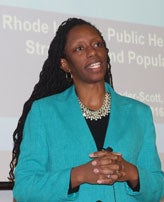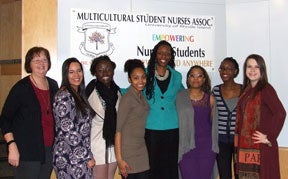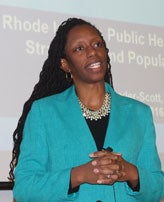 KINGSTON, R.I. – March 15, 2016 – Dr. Nicole Alexander-Scott, director of the Rhode Island Department of Health, told a story about her mother’s life to inspire about 100 University of Rhode Island nursing students to fight against health disparity and inequity.
KINGSTON, R.I. – March 15, 2016 – Dr. Nicole Alexander-Scott, director of the Rhode Island Department of Health, told a story about her mother’s life to inspire about 100 University of Rhode Island nursing students to fight against health disparity and inequity.
She was recently the keynote speaker at a forum hosted by the URI Multicultural Student Nurses Association.
“My mom was from Norfolk, Va. and her mom unfortunately passed away when she was 11 years old,” Alexander-Scott said. “At 12, she moved to New York City where the rest of her siblings were. She began going to school, where oftentimes she was mistreated because of the color of her skin and because of (previous) schooling and her (southern) accent.”
 Alexander-Scott said her mother was assigned to a high school that would only allow her to develop a vocational career.
Alexander-Scott said her mother was assigned to a high school that would only allow her to develop a vocational career.
“She was told she could not be a nurse or teacher because she did not have the capability of achieving that. The vocational high school that she went to did not offer class requirements to get that accomplished.”
Alexander-Scott said her mother soon began working and she also went to an additional high school at night in Brooklyn so she could take the high school classes she would need to get into college.
Her mother landed a job and continued to go to class. She went to Pace University where she earned a bachelor’s degree and became a registered nurse. Later on in her career, she also earned a master’s degree in public administration. She retired as director of nursing at a New York hospital.
“That was a tremendous example for me, and I tell you this story because there shouldn’t be anything that holds you back,” Alexander-Scott told the standing-room-only crowd gathered in a lecture hall at URI’s Center for Biotechnology and Life Sciences. “There should be nothing anyone can say that should prevent you from achieving your goals.
“Using the gifts that you have, the educational experience you have, the opportunities you have, you can really make a difference. The care that a nurse provides is critical. You can offer that extra ear, that extra voice and provide comfort for a patient and help them understand.”
She then gave the students an overview of Rhode Island’s public health priorities and discussed the need to eliminate heath disparities. The three top priorities for the Department of Health are: address the social and environmental determinants of health in Rhode Island; eliminate the disparities of health in the state and promote health equity; and ensure access to quality health services for Rhode Islanders, including the state’s vulnerable populations.
Alexander-Scott said the first priority is the heart of the issue. She used an asthma case to illustrate the complexity of meeting a person’s health care needs.
“You can write a script for their albuterol and feel like you are done. But it’s also about having an understanding of what that patient is experiencing,” the health director said. “You also need to have an understanding of their health literacy and the importance of that medication. Do they have transportation to get to a pharmacy to pick up that medication? Do they have a home to stay in or electricity to refrigerate the medication?”
She asked the nursing students to consider whether the person might be experiencing domestic violence in the home or whether there is violence in the neighborhood. “It might be that taking that medication is not a priority, but just being able to survive is the priority. Also, understanding whether there is mold or tobacco or other things in that house that are contributing to asthma. Are there places we can intervene to address all of those elements.”
Alexander-Scott said health professionals often say 10 percent of health outcomes are a result of what happens in the doctor’s office.
“Ninety percent is determined by social factors, environmental factors, behavioral factors and a genetic element. Homelessness, food access, education, employment — those are the critical components that affect someone’s health outcomes.”
Pictured above
Dr. Nicole Alexander-Scott lectures during a program offered by the URI Multicultural Student Nurses Association.
GATHERING WITH HEALTH DIRECTOR: Members of the URI Multicultural Student Nurses Association pose with Dr. Nicole Alexander-Scott following a lecture at URI. From left are: URI Assistant Professor of Nursing Mary Cloud, Amanda Millan, Janelle Amoako, a recent nursing graduate, Jailene Rodriguez, Director Alexander-Scott, Kai Younger, Bintou Camara and Kasie Moitoso.
URI photos by Rick Wilson

